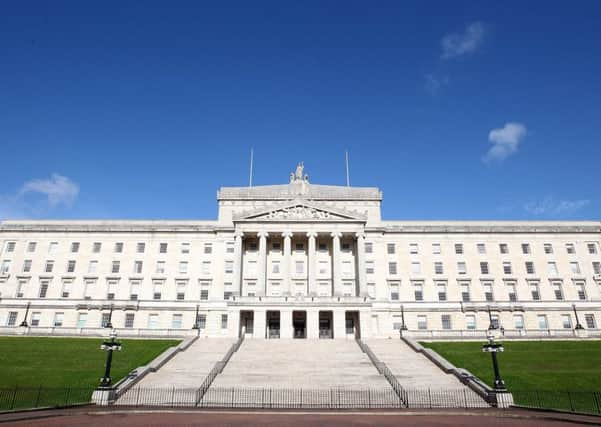Smaller Stormont parties study new programme for Government


The Democratic Unionists and Sinn Fein, the region’s two largest parties, had already carried out provisional work on the coalition’s new five year plan ahead of last week’s election - a poll which consolidated their position as the two main players.
The document was issued to the SDLP, Ulster Unionists and Alliance Party - all junior executive partners in the last mandate - at the opening meeting of negotiations to form a government at Stormont on Tuesday.
Advertisement
Hide AdAdvertisement
Hide AdAs a period of potential horse trading kicked off, Prime Minister David Cameron called both DUP leader Arlene Foster and Sinn Fein’s Martin McGuinness to congratulate them on their success in the Assembly election.
While the UUP and SDLP both had relatively disappointing showings in the election, they retain sufficient strength to take one ministerial position each in the next DUP/Sinn Fein led coalition.
The cross-community Alliance Party does not have the numbers to be there by right, but it is widely anticipated it will be invited to take on the politically sensitive justice portfolio, as it has done in past mandates.
With recent legislation paving the way for parties eligible for government to instead enter official opposition, the smaller parties now face a significant political choice.
Advertisement
Hide AdAdvertisement
Hide AdUUP leader Mike Nesbitt has insisted a security assessment from Northern Ireland’s police chief George Hamilton on paramilitary activity would influence whether his party would go back into power with Sinn Fein. The UUP walked out of the last executive last autumn amid a political crisis about an IRA linked murder.
With a murder in nationalist west Belfast last night - coming in the same 24 hours as two paramilitary style shootings in the city - Mr Nesbitt reiterated the importance of Mr Hamilton’s briefing.
“There is a preliminary document,” he said.
“The deadline for responses is later this week, but of course we all woke up this morning, for the second day running, to news of a shooting, this time a murder. I think getting a security brief is now absolutely critical.”
SDLP leader Colm Eastwood indicated significant changes would be needed before the SDLP signed up to the programme for government.
“We are a long, long way off,” he said.
Advertisement
Hide AdAdvertisement
Hide Ad“We need to work very hard and intensively over the next weeks to make sure we have a substantial programme for government that we can all sign up to - we will only sign up to one that actually meets the needs of the people who have been left behind.”
The parties are due to reconvene on Thursday for further discussions. They have a two week deadline to form the executive.
The new Assembly will meet in plenary session for first time on Thursday, when a vote will be taken to formally confirm Mrs Foster as First Minister and Mr McGuinness as Deputy First Minister.
A Downing Street spokesman confirmed Mr Cameron had phoned the leaders on Tuesday.
Advertisement
Hide AdAdvertisement
Hide Ad“The Prime Minister telephoned Arlene Foster today, following the Northern Ireland elections,” he said.
“The Prime Minister congratulated Arlene Foster on her re-election and they spoke about the importance of maintaining a strong and stable devolved administration in Northern Ireland.
“The Prime Minister also telephoned Martin McGuinness to congratulate him on his re-election, and reiterate his commitment to work closely with him, and the new Executive when it is formed.”
The DUP and Sinn Fein shored up their position as Stormont’s two largest parties in the election. The DUP emerged with the same number of seats it went into the campaign with - 38 - and Sinn Fein fell one to 28.
Advertisement
Hide AdAdvertisement
Hide AdThe SDLP, the once dominant power within nationalism, dropped two seats on its 2011 tally to 12.
Although the UUP repeated the 16-seat haul of 2011, it did not make the inroads Mr Nesbitt had confidently predicted.
The Alliance Party won eight seats - the same as 2011.